1986 - Game 7: Boston Red Sox @ New York Mets

Frank Cashen
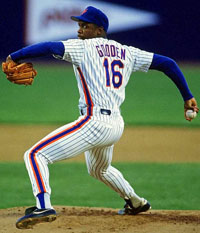
Dwight Gooden
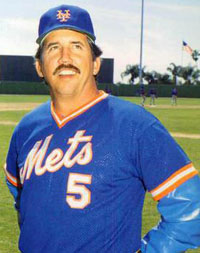
Davey Johnson
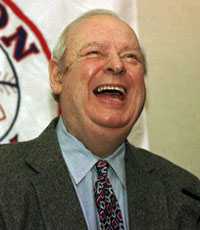
Lou Gorman
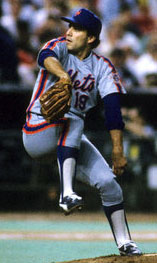
Bob Ojeda
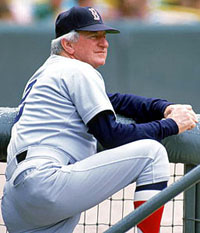
John McNamara
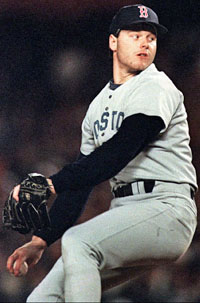
Roger Clemens
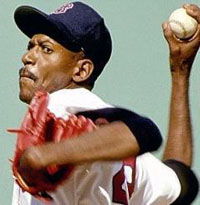
Dennis "Oil Can" Boyd
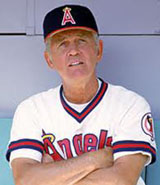
Gene Mauch
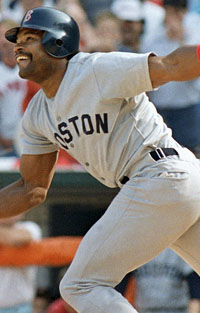
Dave Henderson homers vs Angels
|
When Frank Cashen became GM of the New York Mets in 1980, he, in his own words, took over a huge mess.
- The new owners, Nelson Doubleday and Fred Wilpon, hired Cashen to turn around a pathetic club that had finished last in the NL East three years in a row.
- His bosses assured Cashen that they wanted to build for the future and wouldn't expect a quick fix. Frank told them it would take four or five years to become competitive.
- The good feature of finishing last is that the club gets to pick first in the draft. In his first draft in 1980, Cashen took OF Darryl Strawberry from Crenshaw High School in Los Angeles. Subsequent drafts brought in outfielders Lenny Dykstra and Mookie Wilson, infielders Wally Backman and Dave Magadan, and pitchers Dwight Gooden, Roger McDowell, Calvin Schiraldi, and Rick Aguilera
The Mets selected 19-year-old Roger Clemens in the 12th round in 1981 but could not sign him.
- Cashen also made shrewd trades and free agent signings with C Gary Carter leading the list of acquisitions. He came to New York from the Montreal Expos for four players, the best of whom was Hubie Brooks. P Ron Darling came from the Texas Rangers, P Sid Fernandez from the Dodgers, 1B Keith Hernandez from the Cardinals, 3B Howard Johnson from the Tigers, and Ray Knight from the Astros. The only player Cashen gave up who could be considered equal to any he received was OF-1B Lee Mazzili, and the Mets signed him back as a free agent August 3, 1986.
A veteran of five seasons with the Reds and two with Houston, Knight had started spring training as a backup but took the 3B job by default because, as Cashen told Johnson, I can't trade him. Nobody wants him. Ray would hit .298 and drive in 76 runs in '86.
- Cashen's transformation of the Mets resembled Whitey Herzog's rebuilding of the Cardinals starting in 1980 but took several years longer.
- New York finished no higher than fifth in the NL East until 1984 when they jumped to 2nd. They repeated that finish in '85.
After settling for runner-up two years running, the Mets couldn't wait for the 1986 season.
- They won 98 games in 1985, the third most in the majors, but lost the NL East by three games to the Cardinals.
- Davey Johnson's club felt they were a better team than St. Louis and were anxious to prove their contention in 1986.
The Mets especially wanted to shut up St. Louis manager Herzog (an ex-Met) and his star SS, Ozzie Smith, both of whom had fumed when USA Today proclaimed in a headline "Mets Lose" rather than "Cards Win" the day after the Redbirds clinched the East pennant in '85.
In spring training of '86, Johnson said he expected his team to "dominate." Herzog replied, I guess we can all quit. The Mets have won the pennant already.
They think they won the last two years anyway.
Smith chimed in: They didn't beat us last year. Now they are supposed to be better. But I notice they still haven't beaten us on the field.
- The Mets bolted out of the starting game and raced to a 20-4 record that included a four-game sweep in St. Louis. They seized first place April 24 and never relinquished it. They increased their victories by ten to 108 to win the East by a whopping 21.5 games over the Phillies.
- You can't dominate like that without being solid in all phases of the game. The Mets led the NL in runs with 783 and also in ERA with 3.11. The only club that allowed fewer runs were the Houston Astros, winners of the West.
- After winning the NL Pitching Triple in 1985, 21-year-old Dwight Gooden "slumped" to 17-6 record, 2.84 ERA, and 200 K compared to 80 W. Southpaw Bob Ojeda led the staff in victories with 18 while Sid Fernandez contributed 16 and Ron Darling, 10.
- C Gary Carter won the Silver Slugger Award for being the best offensive player at his position for the second straight year. Carter led the Mets in RBI with 105, 12 more than RF Darryl Strawberry, whose 27 HRs topped the club.
- 1B Keith Hernandez again won the Gold Glove Award at 1B while hitting .310 with 83 RBI. 2B Wally Backman led the hitters with a .320 BA.
- Along the way, the Mets became baseball's most hated team. New York loved their arrogance. The rest of the country hated it. The Mets relished being booed in every road stadium.
Strawberry: I'm sure the league thinks we're going to be cockier than ever next season. I think they'll probably hate us more than this year. But we're ready for that challenge. I can't wait.
- The Mets adopted an us-against-the-wall attitude. They could mess with each other, but let an outsider try and look out.
Ray Knight: We were unique because there were no color lines, no status lines, nothing. We could really get on one another, but in the end, we were brothers.
The Red Sox had also undergone a resurgence under a new GM.
- After being competitive throughout the 70s, including an AL pennant in 1975 and a near miss in '78 (when they lost the one-game playoff to the Yankees on Bucky Dent's HR), the Sox had descending into mediocrity in the '80s.
- So the franchise hired Frank Cashen's top assistant, Lou Gorman, after the 1983 season.
- Except for a third place finish in the AL East in 1982, the Bosox had not risen any higher than 4th place through 1985.
- But as his mentor did with the Mets, Gorman rebuilt the franchise's farm system and made some key deals. He also hired John McNamara as manager to replace Ralph Houk.
Peter Golenbock: McNamara was from the old school of Red Sox managers, Irishmen with little imagination.
- One of his first steps was acquiring 1B Bill Buckner, a 13-year ML veteran, from the Cubs. Just before the '86 season, Gorman added 36-year-old Don Baylor from the Yankees to be his DH. Don added leadership and experience
- The two main products of the draft were 3B Wade Boggs, who came to Boston in '82, and P Roger Clemens from the University of Texas. The big righthander joined the parent club midway through the '84 season.
Boggs provided the club with a hitting machine from the get-go. From 1982-85, he hit .349, .361 (tops in the AL), .325, and .368 (again leading the circuit). He also improved his defense along the way.
- From 1981-84, the Red Sox fielded the youngest pitching staff in the league: Bruce Hurst, Bobby Ojeda, Dennis "Oil Can" Boyd, and Al Nipper along with, ultimately, Clemens. By 1985, the youngsters were ready to pitch the Sox to a pennant.
Like the Mets, the '85 Red Sox moved to the top of the division early - May 14 - and never relinquished control.
- Their 95-66 record put them 5.5 games ahead of the Yankees when the dust cleared. The Sox finished fifth in the AL in runs
and fourth in ERA.
- Boggs not only led the league in batting average but also in walks (105), and on-base % (.453). 13-year veteran Jim Rice topped the club with 110 RBI, and Buckner drove home 102. DH Baylor's 31 homers led the Bosox.
- Clemens captured the AL Cy Young Award and the MVP trophy after leading the league in wins (24 against only four losses) and ERA (2.48).
In his first full season in the majors, Clemens set a record April 29 by fanning 20 in a 3-1 victory over Seattle at Fenway Park.
- Southpaw Hurst compiled an impressive 2.99 ERA. But the rest of the staff was adequate at best. Only one reliever finished under 4.00 in ERA - Steve Crawford (3.92). Bob Stanley and Joe Sambito recorded 16 and 12 saves respectively.
The Bosox survived a bizarre episode in the middle of the season involving emotional P Oil Can Boyd. Facing financial problems - caused in part by his crack cocaine addiction that was known only to the team doctor, who didn't make him take a drug test - Boyd became upset when word came that he was not selected for the AL All-Star team, thus costing him a $25,000 bonus. He went berserk during a game and left the ballpark. McNamara suspened him for three days and ordered him to apologize to the team. Oil Can checked into a hospital for treatment. During his two-week absence, the Sox dropped eight of ten to reduce its lead to 2 1/2 games. The Can returned and finished with 16 victories, including the division clincher September 28.
Both East winners scored dramatic victories in their league championship series.
- The Mets had a surprisingly tough time with the Astros in the NLCS. They lost the opener 1-0 to Mike Scott and his magic fork ball (which some called a spitter) but took Game 2 5-1.
- After falling behind 4-0 in the first two innings, NY had to score two in the bottom of the 9th to take Game 3 at Shea Stadium 6-5.
- But Series MVP Scott twirled another masterpiece
to pull even at two games apiece.
- Game 5 was another nail-biter. Carter singled home the winning run in the bottom of the 12th.
- That set the stage for a classic Game 6, a 16-inning Astrodome marathon that saw the Mets, trailing 3-0 since the 1st, finally break through with three in the 9th. Both teams scored in the 14th before the visitors tallied three in the top of the 16th. But the never-say-die Astros plated two before Jesse Orosco got the final out.
The Mets' true character - or lack thereof - came out on the flight from Houston to New York as they celebrated the NL pennant. After dousing each other with champagne in the clubhouse - including staid GM Cashen - Johnson's rowdies outdid themselves on the United Airlines charter with their wives on board. Champagne and beer flowed freely. When the flight attendants served victory cake, wives and husbands threw their pieces at each other. When the beer ran out, the crew distributed small bottles of hard liquor. That's when the orgy really got out of hand. You can imagine what the enclosed cabin smelled like after numerous passengers threw up. The scene could have come right out of the movie Animal House. In his autobiography, Dwight Gooden recalled: At one point the partying was so out of control, the lavatory door accidentally flew open and there was one of my teammates, his face in front of lines of cocaine.
Fans who met their heroes at Kennedy Airport were shocked. Ron Darling: To have the wives in their snazzy North Beach Leather outifits, covered in vomit, it didn't make for a pretty picture. And the guys were coming off in various forms of disarray of dress. We were gross.
After receiving United's bill for $7,500 for damages to the plane, Cashen berated his manager, Davey Johnson, for the team's lack of discipline.
P Bobby Ojeda told Jeff Pearlman when the latter began work on a book on the '86 Mets, If you work on this hard, you're gonna find that we were a bunch of vile fuckers.
To keep matters in perspective, the Mets' drug use, especially of marijuana and cocaine, was only slightly more extreme than that of most teams in an era when innumerable players regularly used amphetamines to gain an "edge" for games.
The Red Sox needed seven games to subdue California in the ALCS.
So teams from Boston and New York met in the World Series for the first time since 1912 when the Red Sox edged the Giants in eight games.
- It was also the first Series matching northeastern teams since Pirates-Yankees in 1960.
- The Mets were the overwhelming favorite, 8-to-5 or even 2.5-to-1.
- But some writers, like Tom Boswell of the Washington Post, gave Boston a strong chance. Over a season, take the Mets. They're deeper in starting pitchers, bullpen and bench; they're faster and smarter and flash more leather. In a short series, however, it is a toss-up because the Mets' big edges - their vastly better fourth and fifth starters, their double-whammy of two bullpen stars, not one - are negated by October off-days. ... Toss in that the Mets feel lucky but exhausted after their fabulous playoff series while the Red Sox are exhilirated, fresh after two blowouts at home and convinced they're touched by underdog destiny.
- The first two games went as Boswell envisioned.
|
|
Video of Game 6
|
Series Results
- Saturday, October 18 @ New York: Red Sox 1 Mets 0
WP: Bruce Hurst; LP: Ron Darling
- Sunday, October 19 @ New York: Red Sox 9 Mets 3
WP: Steve Crawford; LP: Dwight Gooden
- Tuesday, October 21 @ Boston: Mets 7 Red Sox 1
WP: Bob Ojeda; LP: Dennis Boyd
- Wednesday, October 22 @ Boston: Mets 6 Red Sox 2
WP: Darling; LP: Al Nipper
- Thursday, October 23 @ Boston: Red Sox 4 Mets 2
WP: Hurst; LP: Gooden
- Saturday, October 25 @ New York: Mets 6 Red Sox 5
WP: Rick Aguilera; LP: Calvin Schiraldi
Boston won the first two games at Shea Stadium.
- Bruce Hurst pitched a masterpiece in Game One. He held the heavy-hitting Mets to four hits and no runs in eight innings. Calvin Schiraldi got the save.
- The highly anticipated Game Two duel between the young aces, Clemens and Gooden, proved a disappointment. Neither lasted past the fifth inning. The Sox pounded 18 hits in a 9-3 romp.
- With ecstatic Boston fans dreaming of winning their first World Series since 1918 without having to return to New York, the Mets took Games Four and Five by a combined score of 13-3 behind Ojeda and Darling.
- Just when their Faithful feared they were choking yet again, the Bosox retook the Series lead as Hurst outdueled Gooden 4-2 in Game Five.
Like its predecessor, the 1986 World Series is remembered more for Game 6 than Game 7 - and for a play that occurred at 1B.
- Trailing 3-2 in the bottom of the 8th, the Mets tied the score on Carter's SF.
- But just as he had done in Game 5 against the Angels, Henderson came through with a leadoff HR in the top of the 10th. When Marty Barrett singled in an insurance run, Red Sox Nation prepared to celebrate the long-awaited championship.
- Schiraldi got the first two outs with ease. One out to go to erase the Curse of the Bambino!
- But Carter kept Mets' hopes alive with a single to LF. Don't worry, Sox faithful. They need two runs to tie, not one.
- PH Kevin Mitchell followed with another single. Tying run on 1st now.
- Schiraldi jumped ahead of Knight 0-2. One strike to go! But Ray lined a one-bagger into RCF to score Carter and send Mitchell to 3rd.
- At that point, McNamara made a decision that is still second-guessed by Red Sox fans. He brought in Bob Stanley to pitch to Mookie Wilson.
- Bob proceeded to uncork a wild pitch that allowed the typing run to cross the plate and the winning run to move to 2nd.
- Continuing one of the most famous at-bats in baseball history, Mookie ran the count full, fouled off several pitches, then hit a dribbler down the 1B line. Well, we get to go to the 11th, sighed Sox fans. But the fates had a different idea. The ball got past Buckner, and Knight raced home with the winning run.
McNamara was questioned about his decision to leave Buckner in the game in the bottom of the 10th. All season long, the 36-year-old had suffered with a painful left ankle. To make matters worse, he had torn his right Achilles tendon during the ALCS. He took cortisone shots to ease the pain. In his own defense, McNamara explained after the game, Bill has good hands, and he was running well tonight.
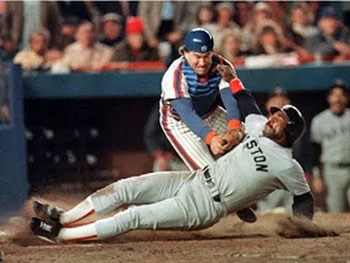
Carter tags Jim Rice in Game 6
|
|
|
Continue to Game 7 - Part 2
|
|